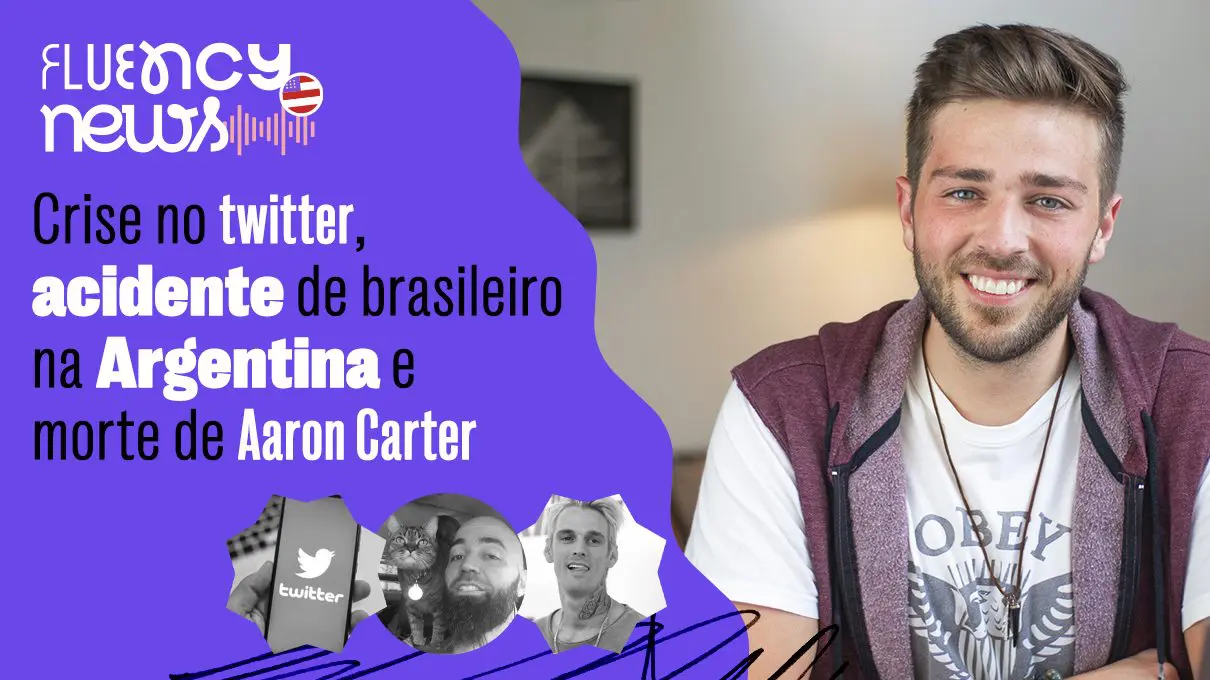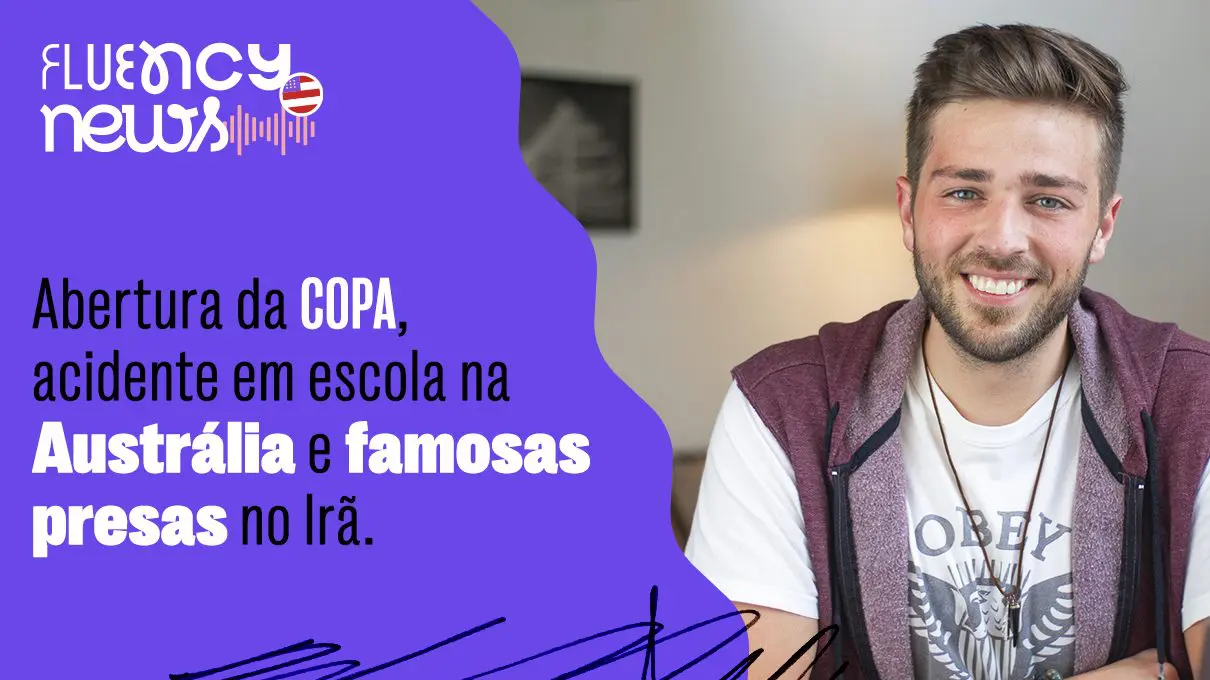Fluency News 44

Descubra as principais notícias da semana e pratique seu inglês com o Fluency News!
Navegue pelo conteúdo
Hello, everyone!
Sejam bem-vindos e bem-vindas a mais um episódio da nossa série de podcasts, o Fluency News! Aqui, você vai poder treinar a sua escuta e ficar por dentro do que está acontecendo no mundo, sempre com as três principais notícias da semana, tudo em inglês! Ao longo do episódio, nós também adicionamos explicações em português das coisas que achamos que precisam de mais atenção, assim você não perde nenhum detalhe!
No episódio desta semana, vemos a multa de 500 milhões de euros que o Google será obrigado a pagar, e as boas notícias vindas do Relatório Anual de Câncer nos Estados Unidos. Também falamos sobre os protestos acontecendo na África do Sul e em Cuba.
Como aproveitar este podcast
- Iniciantes: Leia a transcrição antes de ouvir e anote palavras desconhecidas.
- Intermediários: Ouça o podcast acompanhando a transcrição.
- Avançados: Ouça sem a transcrição e tente compreender o máximo possível.
Toda semana, temos um novo episódio do Fluency News, não deixe de escutar! See you!
Este episódio foi escrito por Lívia Pond.
Transcrição do episódio
What is up, everyone! Welcome back to Fluency News, Fluency Academy’s news podcast series. I’m your host, Scott Lowe, and I’m thrilled you decided to join me today. Our time here is the perfect way for you to train your English skills and remain an informed citizen of the world.
We have a couple of big stories today, so I won’t ramble on too much. Before we start, let me just remind you to check fluency.io for the sources and the transcript of this episode. You’ll also find over a thousand lessons in all the languages Fluency Academy currently teaches, so don’t miss out.
We’re going to start this episode with some technology related news. Google was fined 500 million euros on Tuesday, July 13th, by French competition regulators for failing to negotiate “in good faith” licensing deals with publishers and news agencies.
It is “the biggest ever fine” imposed by the Competition Authority for a company’s failure to adhere to one of its rulings, the agency’s chief Isabelle De Silva told reporters.
In a ruling published on its website, the Competition Authority also ordered the US internet giant to present media publishers with “an offer of remuneration for the current use of their copyrighted content”, or risk paying additional damages of up to 900,000 euros a day.
A Google spokesperson said in a statement to AFP that the company was “very disappointed” by the decision.
“We have acted in good faith during the entire negotiation period. This fine does not reflect the efforts put in place, nor the reality of the use of news content on our platform,” the company insisted.
“This decision is mainly about negotiations that took place between May and September 2020. Since then, we have continued to work with publishers and news agencies to find common ground.”
The long-running legal battle has centered on claims that Google has been showing articles, pictures and videos produced by media groups when displaying search results without adequate compensation.
In January, Google agreed to a major digital copyright deal with French publishers. As part of that deal, the company said it would negotiate individual licenses with members of France’s press alliance covering related rights and access to a new service called News Showcase.
France isn’t the only country taking Google to task over compensation for news organizations. Australia last year required Google and Facebook to pay media outlets for the right to feature their stories. Facebook initially refused, at one point restricting Australians from viewing or sharing news content, before later coming to an agreement with the government.
Um tempo verbal bem comum em notícias é o Present Perfect. Isso acontece porque o Present Perfect é usado para falar de ações que ainda não terminaram, ou então estão em um tempo que ainda não se encerrou. Muitas notícias são a respeito de situações que são “ongoing”, em progresso, e por isso, nem sempre é possível usar o Simple Past, que usamos para falar de ações que se encerraram no passado. Esses são os tempos verbais mais comuns encontrados em jornais, notícias e sites, apesar de frequentemente termos o uso do futuro, para fazer conjecturas ou falar de algo que ainda não aconteceu. Usamos o verbo HAVE, na sua forma do presente, como auxiliar no Present Perfect, e muitas vezes, a frase contém um indicador de tempo, como JUST, NEVER, EVER, YET ou ALREADY. Nessa notícia, temos como exemplos “have acted” e “has centered”.
One of our main stories today takes us to South Africa, where riots have become deadly. At least 45 people have died in the violence that has been engulfing parts of South Africa since the jailing of former President Jacob Zuma last week.
Zuma, 79, was sentenced last month for defying a constitutional court order to give evidence at an inquiry investigating high-level corruption during his nine years in office until 2018.
Protesters clashed with security forces in several areas of the country, and looters ransacked shopping malls on Tuesday as frustrations over poverty and inequality boiled over in to the country’s worst unrest in years.
Many of the deaths occurred in chaotic stampedes as scores of people looted food, electrical appliances, liquor and clothing from retail centers, KwaZulu-Natal province premier Sihle Zikalala told the press on Tuesday morning.
“Yesterday’s events brought a lot of sadness. The number of people who have died in KwaZulu-Natal alone stands at 26. Many of them died from being trampled on during a stampede while people were looting items,” said Zikalala.
President Cyril Ramaphosa has described the deadly violence and protests as unprecedented in the 27 years since the end of the apartheid regime.
He announced late on Monday that he was dispatching troops to help overwhelmed police halt the unrest and “restore order”.
Authorities have been unable to stem sporadic outbreaks of violence across two provinces since the former president Jacob Zuma handed himself over to police to serve a 15-month prison sentence last week.
Security officials said the government was working to ensure the violence and looting did not spread further, but they stopped short of declaring a state of emergency.
“No amount of unhappiness or personal circumstances from our people gives the right to anyone to loot, vandalise and do as they please and break the law,” Police Minister Bheki Cele told a news conference.
Al Jazeera’s Fahmida Miller reporting from Johannesburg said looting and rioting continued throughout the night and into the morning.
“Police are trying to manage the situation. Looters are trying to access stores and shops even with police around,” Miller said.
“We are also seeing crowds starting to get hostile towards the police and throwing stones at them. Police are using rubber bullets and tear gas to try and disperse them,” Miller added.
At least 750 people have been arrested, and a 15-year-old boy was killed when he was shot with a rubber bullet to the chest.
Nessa notícia, temos o uso do tempo verbal Simple Past, que usamos para descrever ações que se iniciaram e foram encerradas no passado. Esse é o tempo verbal mais utilizado em notícias, já que sempre reportamos algo que já aconteceu. Pode ser que às vezes seja um pouco mais complicado identificar se o tempo verbal correto a ser usado é o Present Perfect ou o Simple Past. Nesse caso, é preciso lembrar que quando usamos o Simple past, estamos falando de um tempo específico no passado, e mesmo não tendo uma indicação específica na frase, é possível perceber pelo contexto. O Present Perfect, por usa vez, é usado para falar de situações no passado que ainda não acabaram, ou num período de tempo que ainda não acabou, focando no resultado no presente
In Cuba, people are also protesting. In an unprecedented display of anger and frustration, thousands of people took to the streets on Sunday (July 11) in cities and towns across the country, to call for the end of the decades-old dictatorship and demand food and vaccines, as shortages of necessities have reached crisis proportions and COVID-19 cases have soared.
Civilians were shouting “We want freedom” and “We are no longer afraid.”
Cubans in several provinces contacted by Noticias Telemundo confirmed that the government, which controls the only internet provider company on the island, has caused service outages to prevent live broadcasts.
“They do not want the world to see what is happening in Cuba,” said a resident from Havana who asked not to be identified for fear of reprisals from the regime.
President Miguel Díaz-Canel appeared on national television to call on the Army to confront the protesters: “The order to fight has been given,” he said.
Videos broadcast on social networks show special agents, known in Cuba as Black Berets, being deployed in some localities and violently detaining civilians who protested and sang peacefully.
Díaz-Canel also called “all the revolutionaries in the country, all the communists, to take to the streets and go to the places where these provocations are going to take place.”
In a four-hour-long televised address, the president slammed protesters as “counter-revolutionaries” while his foreign minister alleged the demonstrations had been financed and instigated by the United States.
In Miami, hundreds of people gathered in the Little Havana neighborhood in solidarity with the growing protests in Cuba. “I know my family in Cuba is struggling, people are dying. It’s terrible,” Miami resident Christian Guzmán told NBC station WTVJ.
“Right now it’s hard. There’s no food, there’s no medicine. The Covid outbreak. The whole country is in the streets,” another Miami resident, Darío Suárez, said.
U.S. Secretary of State Antony Blinken offered the State Department’s official position supporting the demonstrations.
“The Biden-Harris administration stands by the Cuban people and people around the world who demand their human rights and expect governments to listen to and serve them rather than try to silence them,” he said.
Mexican President Andres Manuel Lopez Obrador said on Monday the U.S. economic embargo of Cuba should be ended to help its people.
“The truth is that if one wanted to help Cuba, the first thing that should be done is to suspend the blockade of Cuba as the majority of countries in the world are asking,” Lopez Obrador told a news conference.
“That would be a truly humanitarian gesture,” he added. “No country in the world should be fenced in, blockaded.”
Dozens of people have been arrested since the protests started, and images on social media showed what appeared to be security forces detaining, beating and pepper-spraying some of the protesters.
O último tempo verbal sobre o qual nós vamos falar hoje é o Present Continuous. Esse tempo verbal tem usos diferentes dependendo do contexto. Em geral, como tem o nome Present ali, pensamos na estrutura VERBO TO BE + VERBO + ING como algo usado para falar de alguma coisa que está acontecendo no momento presente. Só que esse tempo também é usado para falar do futuro. Nós só vamos saber qual é o caso pelo contexto. Nessa notícia, por exemplo, nós temos o uso da estrutura verbo to be mais verbo terminado em ING, na frase “I know my family in CUba is struggling, people are dying.” Aqui, essa estrutura não se refere ao futuro, e sim ao presente, e é possível identificar de qual tempo verbal estamos falando pelo contexto.
As always, how about we end today’s episode with some good news? In the U.S., the annual cancer report found a lot of good news.
The analysis showed that overall cancer death rates continue to decline in men and women for all racial and ethnic groups.
There have been more successes for some forms of cancer over others, with lung cancer and melanoma both killing fewer people than in the past.
Between 2014 and 2018, the report also found, the death rate dropped for 11 of the 19 most common cancers among men and for 14 of the 20 most common cancers among women. But of all cancers, the recent declines in the death rate were largest for lung cancer and the skin cancer melanoma.
“The declines in lung cancer and melanoma death rates are the result of progress across the entire cancer continuum—from reduced smoking rates to prevent cancer to discoveries such as targeted drug therapies and immune checkpoint inhibitors,” said Karen E. Knudsen, CEO of the American Cancer Society, in a statement from the organization.
“It is encouraging to see a continued decline in death rates for many of the common cancers,” said Karen Hacker, director of the CDC’s National Center for Chronic Disease Prevention and Health Promotion. “To dismantle existing health disparities and give everyone the opportunity to be as healthy as possible, we must continue to find innovative ways to reach people across the cancer care continuum—from screening and early detection to treatment and support for survivors.”
And that’s where we’re going to end today’s episode, folks. Remember, constant contact with the language you’re learning is essential! So be sure to check out fluency.io for free lessons, podcasts and many other goodies!
E se você quer chegar à fluência em inglês, espanhol, francês, italiano, alemão, japonês ou mandarim, inscreva-se na nossa lista de espera!
Assim você vai ficar sabendo quando abrirem novas turmas! Desse jeito você não arrisca perder a sua vaga e ficar meses esperando uma nova chance!
Para se inscrever é só apertar no link na descrição desse episódio!
Don’t forget, there’s a new episode of Fluency News every week, and we’ll be waiting for you. Peace out.
Curtiu o conteúdo? Confira o curso de inglês completo e veja as ofertas exclusivas para alunos aqui do portal. 📚
See you next time! 🌞
Stories:
Google hit with record $593 million fine in France over news copyright battle
https://www.cnbc.com/2021/07/13/google-fined-500-million-euros-in-france-over-news-copyright-row.html
https://www.france24.com/en/business/20210713-france-s-anti-trust-authority-fines-google-%E2%82%AC500-million-in-news-copyright-row
South Africa Zuma riots: Death toll mounts amid looting
https://www.bbc.com/news/world-africa-57818215
https://www.theguardian.com/world/2021/jul/13/troops-deployed-in-south-africa-amid-violence-rarely-seen-in-the-history-of-our-democracy
https://www.aljazeera.com/news/2021/7/13/death-toll-rises-as-violence-and-looting-spreads-in-south-africa
South Africa’s government deploys the army to quell unrest
https://www.economist.com/middle-east-and-africa/2021/07/12/south-africas-government-deploys-the-army-to-quell-unrest
https://www.bbc.com/news/world-africa-57803513
https://news.yahoo.com/jacob-zuma-riots-south-africa-101727743.html
https://www.theguardian.com/world/2021/jul/12/arson-looting-fourth-day-jacob-zuma-jailing-south-africa
‘Freedom!’ Thousands of Cubans take to the streets to demand the end of dictatorship
https://www.miamiherald.com/news/nation-world/world/americas/cuba/article252713788.html
https://www.nbcnews.com/news/latino/-are-no-longer-afraid-thousands-cubans-protest-government-rcna1386
Police patrol Havana in large numbers after rare protests
https://abcnews.go.com/International/wireStory/police-patrol-havana-large-numbers-demonstrations-78801251
https://apnews.com/article/cuba-protests-3772cca0298adac7ce8947ff3aac48c8
Mexico president calls for end to Cuba trade embargo after protests
https://www.reuters.com/world/americas/mexico-president-calls-end-cuba-trade-embargo-after-protests-2021-07-12/?utm_source=reddit.com
Cuba protests: Arrests after thousands rally against government
https://www.bbc.com/news/world-latin-america-57813704
On Cuba, Biden Has Adopted Politically Inconvenient Maximum Pressure of Trump
https://www.newsweek.com/cuba-biden-has-adopted-politically-inconvenient-maximum-pressure-trump-1608971
Cuban president claims protests part of US plot to ‘fracture’ Communist party
https://www.theguardian.com/world/2021/jul/12/cuba-protests-economic-crisis-president-miguel-diaz-canel
Cuba’s internet cutoff: A go-to tactic to suppress dissent
https://apnews.com/article/business-technology-cuba-ca1ae7975e04481e8cbd56d62a7fb30e
Annual Cancer Report Finds a Lot of Good News
https://gizmodo.com/annual-cancer-report-finds-a-lot-of-good-news-1847251158
https://www.eurekalert.org/pub_releases/2021-07/acs-art070521.php
https://www.statnews.com/2021/07/08/cancer-death-rates-2021/
Playlist







































































































 Curso de Inglês
Curso de Inglês
 Curso de Espanhol
Curso de Espanhol
 Curso de Francês
Curso de Francês
 Curso de Mandarim
Curso de Mandarim
 Curso de Italiano
Curso de Italiano
 Curso de Japonês
Curso de Japonês
 Curso de Alemão
Curso de Alemão
 Curso de Coreano
Curso de Coreano







 Blog
Blog  Podcast
Podcast  Lives
Lives  Aulas
Aulas  eBooks
eBooks  Minicursos
Minicursos














